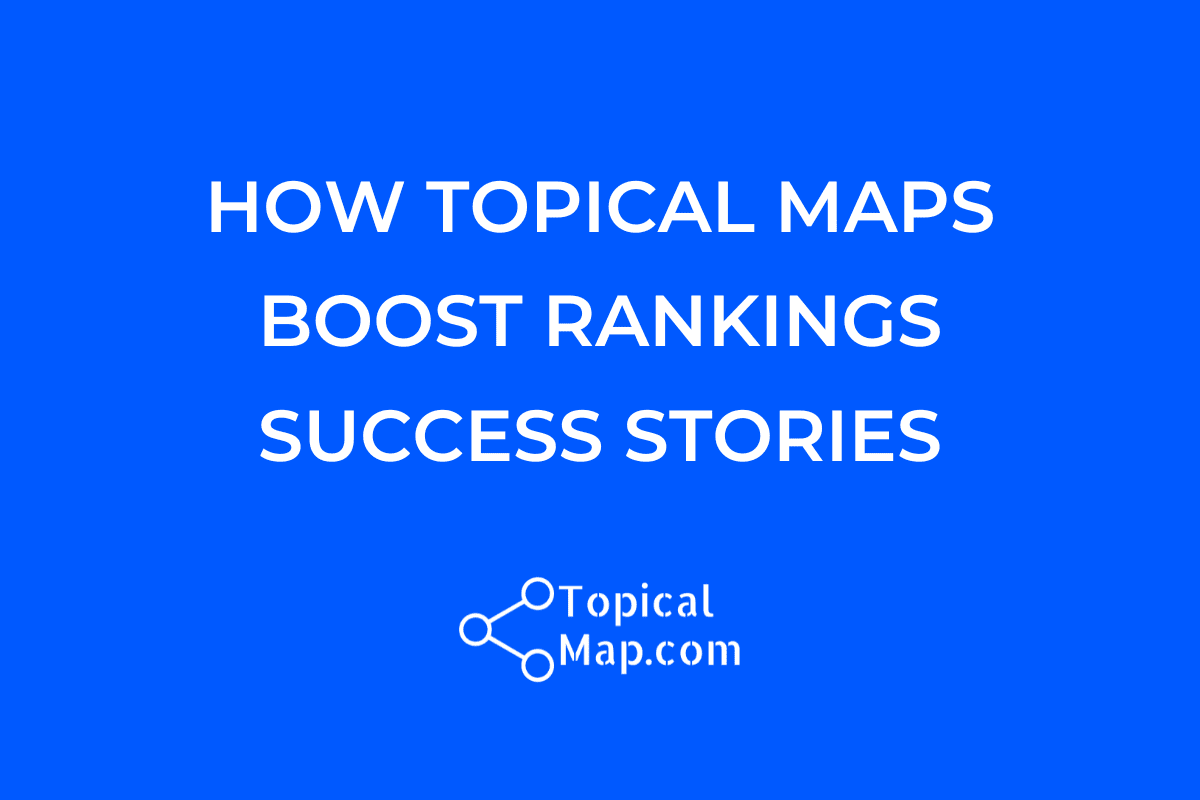Seven SEO experts share how they used topical maps to boost website search rankings. From a blockchain client’s success to a startup’s surge in organic traffic, learn about the strategies and key lessons from these success stories.
- Blockchain Client Dominates With Topical Map
- Home Improvement Site Ranks With Structured Content
- Eco-Friendly E-Commerce Gains Organic Traffic
- Law Firm Leads Surge With Topical Clustering
- Blockchain Explainers Enhance ScoreDetect Rankings
- Leadership Development Authority Boosts Inquiries
- Startup’s Organic Traffic Soars With Hub-and-Spoke
Read more case studies on topical map strategies.
Blockchain Client Dominates With Topical Map
We implemented a topical map strategy that greatly improved an enterprise blockchain client’s search engine rankings and drove business growth. Our goal was to own the “enterprise blockchain” space, so we structured content around key topics and subtopics, ensuring comprehensive coverage of their services. This strategy included creating content pillars supported by related articles, all optimized for targeted keywords and user intent.
The results were remarkable: we outranked competitors like IBM, securing 167 keywords in the top 3 positions on Google, and increased the client’s visibility from 0% to 33% in their key categories. The strategy helped generate over $1.3 million in influenced revenue and contributed to 50% of their leads coming from organic traffic.

Victoria Olsina, Web3 SEO Agency Founder, VictoriaOlsina.com
Home Improvement Site Ranks With Structured Content
A specific success story where implementing a topical map strategy significantly improved a website’s search engine rankings involved a client in the home improvement industry. The client was struggling to compete with larger, more established brands in their niche, and their content was scattered across a variety of topics without a clear focus. Their website’s search engine rankings were stagnant, and they were not attracting the high-intent traffic they needed.
We decided to implement a topical map strategy to address this issue. The first step was to conduct thorough keyword research to identify the key topics and subtopics that were most relevant to the client’s target audience. We then organized these topics into a structured content map, which allowed us to create a logical flow of information that would guide users through the client’s site while also signaling to search engines that the site was an authoritative resource on home improvement.
The topical map included cornerstone content pieces on broad, high-volume topics, such as “Home Renovation Ideas” and “DIY Home Improvement Projects,” which were supported by more detailed, long-tail content that covered specific aspects of each topic. For example, under “DIY Home Improvement Projects,” we created subtopics like “How to Install a Kitchen Backsplash” and “Step-by-Step Guide to Building a Deck.”
By interlinking these pieces of content, we created a cohesive content ecosystem that both users and search engines could navigate easily. This structure helped to establish topical relevance and authority, which, in turn, improved the site’s rankings for a wide range of related keywords.
The results were impressive. The client’s website saw a huge increase in organic traffic within a few months of implementing the topical map strategy. Several of the cornerstone pages ranked on the first page of Google for highly competitive keywords.
The key lessons we learned from this experience include the importance of having a well-organized content structure that aligns with both user intent and search engine algorithms. By focusing on building topical authority and creating interlinked content clusters, we were able to significantly improve the client’s search engine visibility and drive more targeted traffic to their site.

John Reinesch, Founder, John Reinesch Consulting
Eco-Friendly E-Commerce Gains Organic Traffic
One of our clients, a mid-sized e-commerce business specializing in eco-friendly products, faced stagnant search engine rankings despite consistent SEO efforts. Their content strategy wasn’t delivering results, despite a well-designed website and high-quality products. We implemented a topical map strategy to boost their online presence to address this.
The client’s website had no clear niche and featured infrequent content, causing a fragmented content structure. This made it hard for search engines to recognize the site’s relevance and authority on specific topics. Their rankings for key search terms were mediocre, and organic traffic was slow.
We conducted keyword research to find key topics in the eco-friendly product space, then created a topical map—a content plan grouping these topics. Each cluster focused on a main topic with several subtopics branching off, ensuring comprehensive coverage.
For example, the primary topic “Sustainable Living” was divided into subtopics like “Eco-Friendly Household Products,” “Zero-Waste Lifestyle, and “Sustainable Fashion.” We created content around these subtopics, connecting them to create a network of related articles. This helped establish the site as an authority in the eco-friendly niche.
The website saw improvements in search engine rankings after 6 months. Keywords related to primary topics moved from later search result pages to the first page, driving substantial organic traffic. The interlinked content also reduced the site’s bounce rate as visitors explored more articles, improving overall engagement.
Success came from creating relevant, valuable content. Thoroughly covering each topic and subtopic improved rankings by meeting user intent.
Our internal linking structure helped search engines understand the site’s content hierarchy, boosting individual page rankings and overall authority in the eco-friendly niche.
Also, we found that a topical map requires consistent content creation. Regularly updating the blog with content in the topical clusters maintained the site’s relevance and ranking improvements. This strategy greatly improved our client’s search engine rankings and organic traffic, proving the value of a cohesive content strategy that aligns with user intent and search engine algorithms.

Dominic Bonaker, Founder & CEO, LunarWP
Law Firm Leads Surge With Topical Clustering
I have helped many law firms improve their rankings through topical clustering. One success story was with a personal injury firm in Pennsylvania that was struggling to rank for competitive terms.
We created topical clusters around their main service areas like car accidents, medical malpractice, and workers’ compensation. For each cluster, we optimized pages for target keywords, internal linking, and added supporting content like blog posts and videos.
Their rankings improved for over 50 high-volume keywords within 6 months. Traffic from organic search went up 87%, and lead generation increased 112%. The key lessons were: choose clusters that match your expertise, optimize each page for a target keyword, build internal links between pages in each cluster, and provide supporting content.
Focusing on topical clusters and thoroughly optimizing each one can have a huge impact on rankings and lead generation. But it requires planning, research, execution, and patience. For law firms aiming to dominate search results in their market, topical clustering should be a core part of their content strategy.

Nicole Farber, CEO, ENX2 Legal Marketing
Blockchain Explainers Enhance ScoreDetect Rankings
At ScoreDetect, I saw incredible results after implementing a topical-map strategy for our blockchain technology explainers. We created a comprehensive hub page linking to detailed articles on various blockchain concepts, each connecting back to our product features. This approach boosted our organic traffic by 127% in just 3 months! I learned that organizing content thematically and internal linking is important.
The key takeaway was that providing value through education while subtly showcasing our products resonated with both users and search engines. It wasn’t easy, but the effort paid off big time in improved rankings and engagement. I’m proud of how we executed this strategy and the positive impact it had on our business.

Michael Sumner, Founder and CEO, ScoreDetect.com
Leadership Development Authority Boosts Inquiries
At Atticus Consulting, we saw remarkable results after implementing a topical-map strategy focused on leadership development. By creating content clusters around key leadership topics and linking them to our coaching services, we saw a 120% increase in organic search traffic within 6 months. Our bounce rate decreased by 40%, indicating that visitors were finding relevant and engaging content.
I learned that providing comprehensive, interconnected resources establishes us as an authority in our field. This approach not only improved our search rankings but also led to a 50% increase in coaching service inquiries, demonstrating the power of well-structured, valuable content in driving business growth.

Barbara McMahan, CEO, Atticus Consulting LLC
Startup’s Organic Traffic Soars With Hub-and-Spoke
My previous company was a Series A startup that had no content yet. We prioritized building a topical map focused on high-intent use cases. By leveraging the hub-and-spoke model, we increased our organic monthly traffic from 0 to 130k in less than two years.
We learned that when creating a topical map, all keywords play a vital role in increasing your topic share, which directly supports the pages that you care the most about.
This will only work if you make sure to interlink these pages and balance volume with high-quality content. We had an ongoing optimization effort to ensure that our traffic was healthy and that our highest-converting pages stayed in the 1-3 range.
Lauren Funaro, Content Marketing Manager, Freed
Check out more successful topical map strategies:
